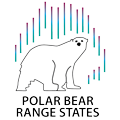 Photo credit: U.S. Fish and Wildlife Service
Photo credit: U.S. Fish and Wildlife Service
Adaptive Management
Adaptive management is a planned and systematic process for continuously improving environmental management decisions and practices by learning about their outcomes. It is a means of making decisions in cases where knowledge gaps exist about the impacts of particular activities on a situation. Adaptive management provides flexibility to identify and implement new measures or to modify existing ones during the life of a project or activity. Assumptions can be tested and, if unanticipated adverse effects are detected, necessary, corrective actions can be taken.
Adaptive management is essential to planning and decision-making for polar bear conservation and management throughout the circumpolar region, since the impacts of climate change and other stressors on polar bears and their ecosystems will be wide-ranging and their timing and significance, highly uncertain. Adaptive management can also be applied to project environmental assessments and associated regulatory approvals that may affect polar bears.
Monitoring the efficacy of mitigation measures and research are key components of an adaptive management framework. One of the primary purposes of monitoring is to reduce the critical uncertainty that impedes the ability to make informed management decisions. Uncertainty can take on many forms. For example, it could be the lack of knowledge regarding the status and trends of a particular subpopulation or it could be associated with a new type of activity (e.g., year-round shipping) within polar bear habitat. Regardless, it is important to be cautious when making management decisions in the face of uncertainty, conflicting or a lack of information.
Source: Circumpolar Action Plan





